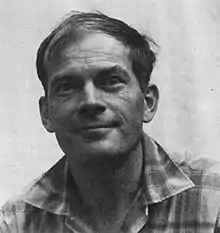Robert H. MacArthur
Robert Helmer MacArthur (April 7, 1930 – November 1, 1972) was a Canadian-born American ecologist who made a major impact on many areas of community and population ecology. He is considered a founder of ecology and evolutionary biology.[1]
Robert Helmer MacArthur | |
|---|---|
 | |
| Born | April 7, 1930 |
| Died | November 1, 1972 (aged 42) |
| Alma mater | Marlboro College (BA) Brown University (AM) Yale University (PhD) |
| Known for | Island biogeography |
| Spouse | Elizabeth Bayles Whittemore |
| Children | 4 |
| Awards | National Academy of Sciences (1969) |
| Scientific career | |
| Fields | |
| Institutions | |
| Thesis | Population Ecology of Some Warblers of Northeastern Coniferous Forests (1957) |
| Doctoral advisor | G. Evelyn Hutchinson |
| Other academic advisors | David Lack |
Early life and education
MacArthur was born in Toronto, Ontario, to John Wood MacArthur and Olive Turner in 1930. He later moved to Marlboro, Vermont, as his father moved from the University of Toronto to Marlboro College.[2][3] MacArthur received his Bachelor's degree in mathematics from Marlboro College, followed by a Master's degree in mathematics from Brown University in 1953.[3] A student of G. Evelyn Hutchinson, MacArthur earned his Ph.D. from Yale University in 1957; his thesis was on the division of ecological niches among five warbler species in the conifer forests of Maine and Vermont.[4] From 1957 to 1958, MacArthur worked as a postdoc with David Lack.[4]
Career
MacArthur was a professor at the University of Pennsylvania, 1958–65, and professor of biology at Princeton University, 1965-72. He played an important role in the development of niche partitioning, and with E.O. Wilson he co-authored The Theory of Island Biogeography (1967), a work which changed the field of biogeography, drove community ecology and led to the development of modern landscape ecology. His emphasis on hypothesis testing helped change ecology from a primarily descriptive field into an experimental field, and drove the development of theoretical ecology.[5][6][1]
At Princeton, MacArthur served as the general editor of the series Monographs in Population Biology, and helped to found the journal Theoretical Population Biology.[7] He also wrote Geographical Ecology: Patterns in the Distribution of Species (1972).[1] He was elected to the National Academy of Sciences in 1969. Robert MacArthur died of renal cancer in 1972.[8]
References
- Wilson, Edward O.; Hutchinson, G . Evelyn (1 January 1989). "Robert Helmer MacArthur 1930—1972". Biographical Memoirs (PDF). Vol. 58. Washington, DC: The National Academies Press.
- Odenbaugh, Jay (2011). "Philosophical themes in the work of Robert H. Macarthur". In Gabbay, Dov M.; Brown, Bryson; Thagard, Paul; De Laplante, Kevin; Peacock, Kent; Woods, John (eds.). Philosophy of Ecology. Handbook of the Philosophy of Science. Vol. 11. Elsevier. ISBN 978-0-444-51673-2.
- Odenbaugh, Jay (2013). "Searching for Patterns, Hunting for Causes: Robert MacArthur, the Mathemical Naturalist". In Harman, Oren; Dietrich, Michael R. (eds.). Outsider Scientists: Routes to Innovation in Biology. University of Chicago Press. pp. 181–189.
- Anderson, Ted R. (2013-06-01). The Life of David Lack: Father of Evolutionary Ecology. Oxford University Press. p. 203. ISBN 9780199339938.
- Pianka, Eric; Horn, H.S. (2005). "Chapter 11, Ecology's Legacy from Robert MacArthur". In Cuddington, K.; Biesner, B. (eds.). Ecological paradigms lost : routes of theory change. Amsterdam: Elsevier Academic Press. pp. 213–232. ISBN 978-0120884599.
- Fretwell, Stephen D. (November 1975). "The Impact of Robert Macarthur on Ecology". Annual Review of Ecology and Systematics. 6 (1): 1–13. doi:10.1146/annurev.es.06.110175.000245. ISSN 0066-4162.
- Rosenberg, Noah A. (2020). "Fifty years of Theoretical Population Biology" (PDF). Theoretical Population Biology. 133: 1–12. doi:10.1016/j.tpb.2020.04.001. PMID 32275891. S2CID 215733920. Retrieved 21 February 2023.
- Odenbaugh, Jay (2013). "Chapter 10: Searching for Patterns, Hunting for Causes: Robert MacArthur, the Mathematical Naturalist". In Harman, Oren Solomon; Dietrich, Michael R. (eds.). Outsider scientists : routes to innovation in biology. Chicago: University of Chicago Press. ISBN 978-0226078403.